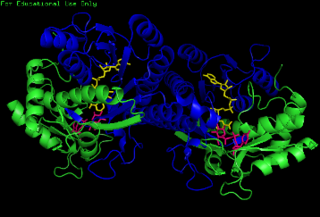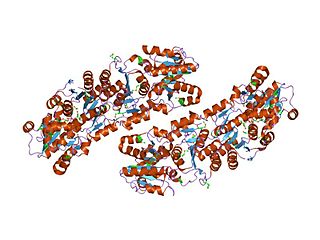
N-Acetylmannosamine is a hexosamine monosaccharide. It is a neutral, stable naturally occurring compound. N-Acetylmannosamine is also known as N-Acetyl-D-mannosamine monohydrate,, N-Acetyl-D-mannosamine which can be abbreviated to ManNAc or, less commonly, NAM). ManNAc is the first committed biological precursor of N-acetylneuraminic acid. Sialic acids are the negatively charged, terminal monosaccharides of carbohydrate chains that are attached to glycoproteins and glycolipids (glycans).
N-acetyllactosamine synthase is a galactosyltransferase enzyme. It is a component of lactose synthase This enzyme modifies the connection between two molecule UDP-galactose and N-actyl-D-glucosamine and generates two different molecules UDP and N-acetyllactosamine as products. The main function of the enzyme is associated with the biosynthesis of glycoproteins and glycolipids in both human and animals. In human, the activity of this enzyme can be found in Golgi apparatus.

Uridine diphosphate N-acetylglucosamine or UDP-GlcNAc is a nucleotide sugar and a coenzyme in metabolism. It is used by glycosyltransferases to transfer N-acetylglucosamine residues to substrates. D-Glucosamine is made naturally in the form of glucosamine-6-phosphate, and is the biochemical precursor of all nitrogen-containing sugars. To be specific, glucosamine-6-phosphate is synthesized from fructose 6-phosphate and glutamine as the first step of the hexosamine biosynthesis pathway. The end-product of this pathway is UDP-GlcNAc, which is then used for making glycosaminoglycans, proteoglycans, and glycolipids.

In enzymology, a dTDP-4-dehydrorhamnose 3,5-epimerase is an enzyme that catalyzes the chemical reaction

In enzymology, a N-acylglucosamine 2-epimerase is an enzyme that catalyzes the chemical reaction
In enzymology, an UDP-arabinose 4-epimerase is an enzyme that catalyzes the chemical reaction
In enzymology, an UDP-glucosamine 4-epimerase is an enzyme that catalyzes the chemical reaction

The enzyme UDP-glucose 4-epimerase, also known as UDP-galactose 4-epimerase or GALE, is a homodimeric epimerase found in bacterial, fungal, plant, and mammalian cells. This enzyme performs the final step in the Leloir pathway of galactose metabolism, catalyzing the reversible conversion of UDP-galactose to UDP-glucose. GALE tightly binds nicotinamide adenine dinucleotide (NAD+), a co-factor required for catalytic activity.
In enzymology, an UDP-glucuronate 4-epimerase is an enzyme that catalyzes the chemical reaction
In enzymology, an UDP-glucuronate 5'-epimerase is an enzyme that catalyzes the chemical reaction

In enzymology, an UDP-N-acetylglucosamine 2-epimerase is an enzyme that catalyzes the chemical reaction

In enzymology, an UDP-N-acetylglucosamine 1-carboxyvinyltransferase is an enzyme that catalyzes the first committed step in peptidoglycan biosynthesis of bacteria:

In enzymology, an UDP-N-acetylglucosamine diphosphorylase is an enzyme that catalyzes the chemical reaction

Bifunctional UDP-N-acetylglucosamine 2-epimerase/N-acetylmannosamine kinase is an enzyme that in humans is encoded by the GNE gene.
(N-acetylneuraminyl)-galactosylglucosylceramide N-acetylgalactosaminyltransferase is an enzyme with systematic name UDP-N-acetyl-D-galactosamine:1-O-(O- - -O-beta-D-galactopyranosyl- -beta-D-glucopyranosyl)-ceramide 4-beta-N-acetyl-D-galactosaminyltransferase. This enzyme catalyses the following chemical reaction
Alpha-1,3-mannosyl-glycoprotein 2-beta-N-acetylglucosaminyltransferase is an enzyme with systematic name UDP-N-acetyl-D-glucosamine:3-(alpha-D-mannosyl)-beta-D-mannosyl-glycoprotein 2-beta-N-acetyl-D-glucosaminyltransferase. This enzyme catalyses the following chemical reaction
Beta-1,3-galactosyl-O-glycosyl-glycoprotein beta-1,6-N-acetylglucosaminyltransferase is an enzyme with systematic name UDP-N-acetyl-D-glucosamine:O-glycosyl-glycoprotein 6-beta-N-acetyl-D-glucosaminyltransferase. This enzyme catalyses the following chemical reaction
Alpha-1,6-mannosyl-glycoprotein 2-beta-N-acetylglucosaminyltransferase is an enzyme with systematic name UDP-N-acetyl-D-glucosamine:6-(alpha-D-mannosyl)-beta-D-mannosyl-glycoprotein 2-beta-N-acetyl-D-glucosaminyltransferase. This enzyme catalyses the following chemical reaction

Protein O-GlcNAc transferase also known as OGT or O-linked N-acetylglucosaminyltransferase is an enzyme that in humans is encoded by the OGT gene. OGT catalyzes the addition of the O-GlcNAc post-translational modification to proteins.
UDP-N-acetylglucosamine 2-epimerase (hydrolysing) (EC 3.2.1.183, UDP-N-acetylglucosamine 2-epimerase, GNE (gene), siaA (gene), neuC (gene)) is an enzyme with systematic name UDP-N-acetyl-alpha-D-glucosamine hydrolase (2-epimerising). This enzyme catalyses the following chemical reaction











